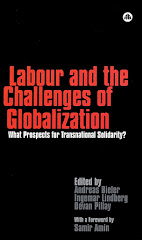Bankers caused the financial market crisis through their mistakes, but it is now the people, who are asked to pay for it. While many banks are back on profitable routes (see, for example, The Telegraph, 6 August 2010), citizens across Europe are expected to pay for the bailouts of banks, be it in the form of unemployment, be it in the form of wage cuts, be it in the form of cut-backs in public services. It is now that governments across Europe cut back on public services including health, education and other social services for disadvantaged groups in society. As Will Hutton wrote in the Guardian on 26 September in relation to the forthcoming budget of the British government, ‘while the country is now exhorted to tighten its belt and pay off its debts, those who created the crisis — the country’s CEOs and bankers, still living on Planet Extravagance, not to mention mainstream politicians — all want to get back to "business as usual": the world of 1997 to 2007’ (Guardian, 26 September 2010).
But workers are not only victims.
Tuesday 28 September 2010
Thursday 23 September 2010
Emerging resistance against budget cuts and the problems with New Labour
On Wednesday, 22 September at 7.30 pm a public meeting took place in Nottingham/UK to discuss and organise resistance against cuts in the public sector at the local level. The meeting was addressed by representatives from the local Trades Union Council, the Communication Workers’ Union, the National Union of Teachers, UNISON as well as a whole range of local campaigns against Mental Health cuts, Learning Disability cuts and School Building cuts amongst others.
Tuesday 14 September 2010
Globalisation and Trade Unions: different challenges and a variety of responses.
 Globalisation has put national labour movements under severe pressure due to the increasing transnationalisation of production and informalisation of the economy. In a new edited collection, labour academics, trade union researchers and social movement activists analyse concrete instances of successful as well as failed strategies to draw out possibilities of, but also obstacles to, transnational labour solidarity in times of global restructuring.
Globalisation has put national labour movements under severe pressure due to the increasing transnationalisation of production and informalisation of the economy. In a new edited collection, labour academics, trade union researchers and social movement activists analyse concrete instances of successful as well as failed strategies to draw out possibilities of, but also obstacles to, transnational labour solidarity in times of global restructuring.
Bieler, Andreas and Ingemar Lindberg (eds.) (2010) Global Restructuring, Labour and the Challenges for Transnational Solidarity. London: Routledge. ISBN 978-0-415-58083-0.
Subscribe to:
Posts (Atom)











